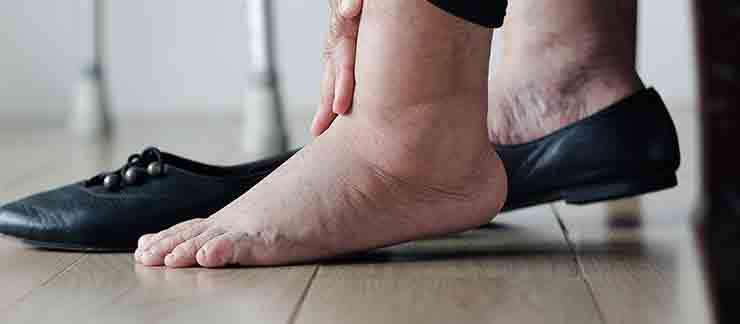
Foot Problems in the Elderly and Fall Risk
When you think about your elderly loved one’s physical condition, you may not focus on the health of their feet. It can be easy to overlook that their feet are a main support system — literally.
Unfortunately, foot pain and other foot problems in the elderly are very common and associated with:
- Weakness
- Frailty
- Exhaustion
- Gait alteration
- Balance difficulties
- Increased swaying while walking
- Decreased walking
- Walking speed
Elderly people with foot problems are more likely to fall, which means good foot care is an essential part of fall prevention for seniors.
What Kinds of Foot Problems Affect the Elderly?
After a lifetime of standing, walking, and running, it’s no surprise many seniors develop foot disorders, which can be painful. Some of the more common disorders affecting the elderly’s feet are:
- Corns and calluses
Corns and calluses are thick, hardened layers of skin around sensitive areas of the feet where a lot of pressure is placed upon. They’re most commonly caused by ill-fitting footwear but can also be caused by an improper walking motion.
- Toenail disorders
Toenail problems can take on a variety of forms and be very painful. Some of the most common toenail disorders in the elderly are fungal infections or ingrown toenails.
- Bunions, hammertoe and claw toe
These painful deformities occur when a toe becomes bent out of shape or grows excess bone. Some types of foot deformities are associated with specific footwear, such as high heels.
- Loss of fat pads
Everyone is born with fat pads that cushion the bottoms of their feet. If you experience a decrease in fat pads, it may not seem like a big deal, but it can cause extreme discomfort. As you age, you can lose these fat pads, which results in painful force being applied to parts of the feet that have no protection.
- Connective tissue disorders
Connective tissues consist of cartilage, bone, tendons, muscles and ligaments. When the connective tissues in the feet become irritated or inflamed, it can lead to painful conditions such as foot tendonitis or plantar fasciitis.
- Poor circulation in feet
Poor circulation can happen when inadequate blood flow arises from certain factors, including sedentary lifestyle, age, obesity, smoking, diabetes and blood clots. If left untreated, the effects could be very serious. It is important to report symptoms of poor circulation in feet to a doctor.
Additional causes of foot issues include systemic disorders like diabetes, osteoarthritis, rheumatoid arthritis, and even congestive heart failure. These conditions can lead to nerve pain, weak and painful joints, and swollen feet. Some people can have acute foot problems, such as plantar fasciitis, and a systemic problem like osteoarthritis at the same time.
Caring for Older Adults’ Feet
There are three major factors to consider for proper foot care in the elderly:
- Regular Care
Make sure someone is checking your elderly loved one’s feet regularly for any changes. Look for open cracks or sores, misshapen toes, discolored or altered toenails, and other changes to the skin such as thickening. Make sure their feet are washed regularly to avoid infection, and their toenails are trimmed as needed. Visit a podiatrist if you notice anything strange about your loved one’s feet. If they have difficulty taking care of their feet on their own — perhaps because they can no longer bend to clip their toenails or see the bottom of their feet — consider using non-medical home care services from a professional home care agency such as Visiting Angels.
- Proper Footwear
Studies show most seniors wear shoes that are too small for reasons such as fashion, altered foot shape, and not realizing their feet keep growing in old age. Make sure your loved one is using the right size footwear by having their feet measured. Also, encourage them to use footwear with more support and avoid wearing high heels.
- Foot orthoses
Foot orthoses, types of specialized inserts placed inside the shoe, can be anything from over-the-counter adhesive pads to custom-made devices prescribed by a podiatrist. They help reduce foot pain and fall risk by changing the way force affects the feet while walking or standing. Visit a podiatrist to determine if your loved one would benefit from orthoses.
Foot care is just one way to practice fall safety for elderly people. To further help protect your loved ones from falling, check out these fall prevention tips.


